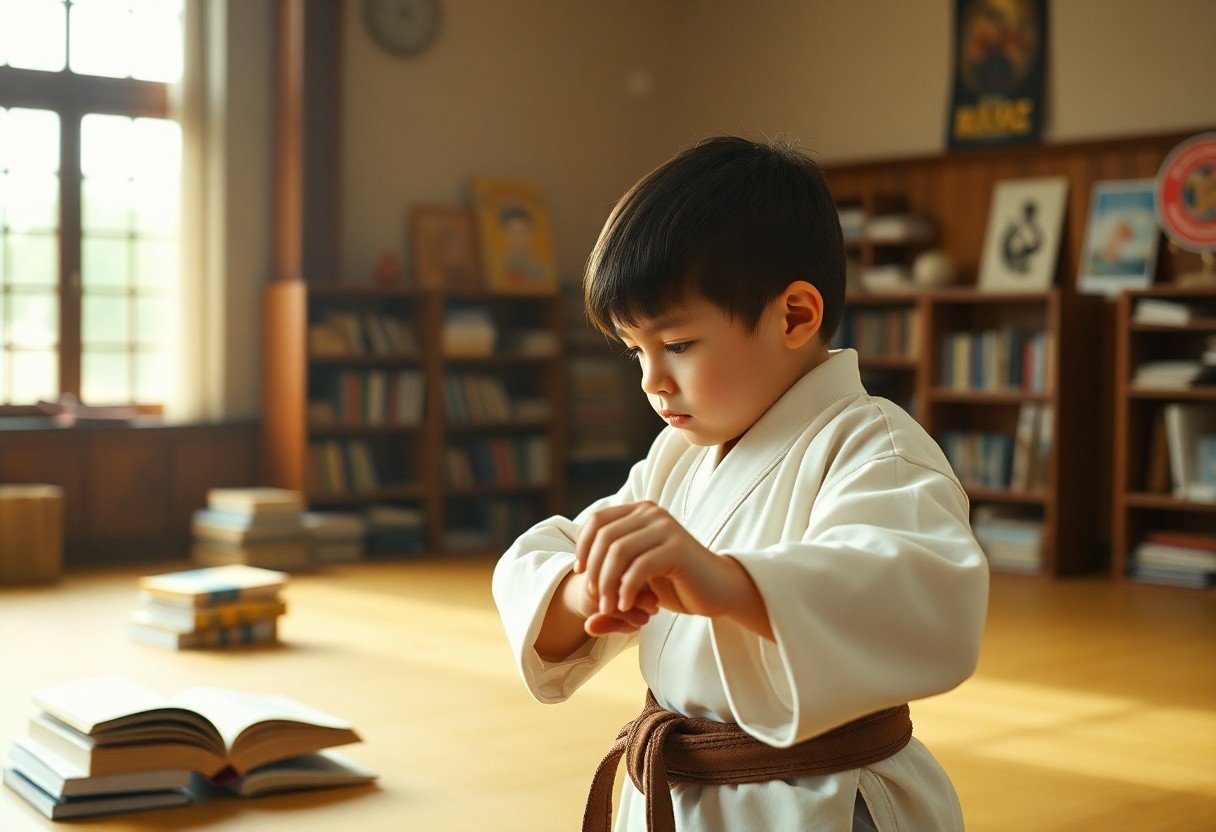There’s a growing body of evidence that suggests martial arts can significantly enhance your child’s academic performance. Engaging in martial arts helps develop necessary skills such as focus, discipline, and respect, which are vital for success in the classroom. By practising these skills regularly, your child can improve their concentration and self-control, leading to better grades and a positive attitude towards learning. In this blog post, we will explore the various ways martial arts can transform your child’s educational experience and support their overall growth.

The Connection Between Martial Arts and Cognitive Development
Your child’s engagement in martial arts can significantly enhance cognitive development, fueling both academic and personal growth. Through structured training and practice, children refine key skills such as focus, discipline, and emotional regulation. These attributes not only boost their martial arts performance but also translate effectively into academic settings, giving your child an advantage in their studies and overall learning experiences.
Enhancing Concentration
Among the many skills developed in martial arts, concentration stands out as an imperative tool for your child’s academic success. The repetitive routines and focused techniques demand attention and mental clarity, fostering an environment where distractions fade into the background. As your child learns to concentrate on their martial arts practice, they will naturally carry these skills into the classroom, improving their ability to absorb and process information.
Boosting Memory Retention
About the enhancement of memory retention, martial arts training provides a unique approach that engages both the mind and body. The various techniques and forms require your child to memorise complex sequences, which reinforces cognitive pathways and improves their overall ability to retain information.
Even more importantly, the practice of martial arts often incorporates repetition and mindfulness, creating a powerful synergy for boosting memory retention. As your child regularly engages in these physical and mental exercises, their brain becomes more adept at storing and recalling information. The discipline instilled through martial arts not only aids academic learning but also enhances their problem-solving abilities and analytical thinking, leading to a well-rounded intellectual profile.
Discipline and Its Impact on Education
One of the most significant benefits of martial arts is the discipline it instils in your child. This discipline often translates into a better focus on their studies, fostering a mindset that values hard work and persistence. It has been observed that students engaged in martial arts experience improved academic performance, as noted How Martial Arts Can Improve Academic Performance. By embracing the principles of self-discipline found in martial arts, your child can develop habits that enhance their learning experiences.
Building Routine and Structure
Impact on your child’s education is profound when they engage in martial arts. The structured environment of martial arts classes helps your child develop a consistent routine, which is key to effective learning. This routine not only aids in time management but also encourages the establishment of a dedicated study schedule, paving the way for academic success.
Stress Management Techniques
To further enhance your child’s academic performance, martial arts provide effective stress management techniques. Through practices such as controlled breathing and mindfulness, your child learns to handle academic pressures calmly.
Education often brings about a significant amount of stress, impacting your child’s ability to focus and learn effectively. Martial arts equip your child with imperative strategies to manage stress, such as breathing exercises and visualisation techniques. These skills can help your child maintain a sense of calm during exams or challenging assignments, ultimately leading to improved performance and a more positive school experience.
Social Skills and Collaboration in Martial Arts
The practice of martial arts offers children a unique opportunity to develop necessary social skills and enhance their ability to collaborate with others. Through structured classes and group activities, young practitioners learn to work together, build trust, and foster friendships, all while gaining confidence in their own abilities. This supportive environment cultivates a sense of community, encouraging your child to communicate effectively and respect their peers.
Teamwork and Communication
Among the various elements of martial arts training, teamwork and communication are paramount. Your child engages in pair drills and group exercises that require them to share information, listen actively, and work toward common goals. These experiences not only improve their social interactions but also help them develop a greater sense of responsibility and accountability.
Empathy and Conflict Resolution
With martial arts, children learn the importance of empathy and effective conflict resolution. They are taught to appreciate their opponents’ perspectives and approach disagreements with a calm mindset. This understanding can extend beyond the dojo, helping your child navigate social situations with greater ease.
But developing empathy and honing conflict resolution skills is about more than just learning techniques. It shifts their focus towards understanding emotions and perspectives, allowing them to respond thoughtfully rather than react impulsively. Children are guided on how to handle disputes through dialogue rather than physical confrontations, leading to more positive outcomes in their relationships. By embracing these skills, your child becomes better equipped to manage challenges both inside and outside the classroom.
Physical Fitness and Academic Performance
Now, engaging your child in martial arts not only boosts their physical fitness but also enhances their academic performance. The discipline and focus acquired through martial arts training cultivate a learning environment that translates into the classroom. For more insights, check out How Martial Arts Can Enhance Academic Performance.
Increased Energy Levels
To achieve optimal physical fitness, participating in martial arts equips your child with increased energy levels. As they develop stamina through rigorous training, they are more likely to stay alert and engaged during their studies.
Health Benefits Leading to Better Focus
Energy and physical fitness derived from martial arts promote overall health benefits that contribute to better focus. When your child is physically active, they are less likely to suffer from fatigue, which can significantly impair their concentration.
Also, regular martial arts practice improves cardiovascular health, leading to enhanced oxygen flow to the brain. This biological boost can result in greater cognitive abilities, thus allowing your child to grasp complex subjects more readily. Furthermore, a balanced diet and improved physical condition from training can mitigate stress-related distractions, allowing for a more productive and focused study environment.
Case Studies and Personal Testimonials
To illustrate the impact of martial arts on academic performance, several case studies showcase impressive results:
- Case Study 1: A 10-year-old student improved their grades by 30% after participating in martial arts for six months.
- Case Study 2: A teenager reported a rise in concentration levels, leading to a 20% increase in exam scores.
- Case Study 3: Parents noted increased confidence in their child, contributing to better classroom participation.
Success Stories from Parents
Across numerous families, many parents have shared positive experiences, highlighting how martial arts has transformed their children’s lives. One parent noted that their child, once struggling with discipline, now demonstrates improved focus and a willingness to engage in academic challenges. Testimonials indicate a direct correlation between martial arts training and enhanced self-esteem, leading to better school performance.
Academic Improvements Recorded
Success in academic performance is evident with documented instances of grade improvement following martial arts training.
Also, after initiating martial arts classes, it has been found that students often experience an increase in focus, better time management, and heightened self-discipline. These attributes not only reference success in martial arts but also extend into the classroom, where students show enhanced engagement and improved results. The combination of physical activity, mental clarity, and increased confidence can significantly impact your child’s educational journey.
Choosing the Right Martial Arts Program for Your Child
Unlike traditional sports, martial arts offer a variety of disciplines that cater to different interests and personalities. Selecting the appropriate martial arts program for your child requires careful consideration of their individual needs, goals, and temperament. You should assess their willingness to engage in the training and the values that the school fosters, as this can significantly affect their overall experience and personal development.
Factors to Consider
Below are some vital factors to consider when choosing a program for your child:
- Age and maturity level
- Location and accessibility
- Instructor qualifications
- Class size and attention ratio
- Focus on character development
Knowing these factors will help you make an informed choice that aligns with your child’s needs.
Recommended Styles and Schools
Among the various styles of martial arts, you may want to consider those that are particularly effective for children, such as Tae Kwon Do, Karate, and Judo. Each style offers unique benefits, with an emphasis on discipline, respect, and self-control. Look for schools that prioritise a positive environment and have instructors who are adept in teaching young students. It is important to find a programme that not only improves physical skills but also fosters confidence and mental resilience in your child, ensuring they thrive in both martial arts and academic settings.
It is vital to engage with potential schools and observe classes, if possible. Speak to instructors about their approach to teaching and how they integrate values such as respect, discipline, and teamwork into their lessons. This will give you insight into whether the environment will be supportive and beneficial for your child. Recall, the ultimate goal is to enhance their overall development in a safe and positive atmosphere that can translate to improved academic performance.
Conclusion
Taking this into account, engaging your child in martial arts can be a transformative experience that extends beyond physical fitness. The discipline, focus, and resilience cultivated through martial arts training can significantly enhance their academic performance. By fostering a strong sense of self-discipline and improving their ability to concentrate, your child can develop the crucial skills needed for success in their studies. Ultimately, integrating martial arts into their routine can support their overall development, paving the way for both academic and personal achievements.
FAQ
Q: How can martial arts enhance my child’s focus in school?
A: Engaging in martial arts training requires children to concentrate on mastering techniques and forms. This practice of focus and discipline in a structured environment translates to improved attention in academic settings. As they learn to block out distractions during their training, they can better apply this skill in the classroom, leading to enhanced learning outcomes.
Q: In what ways can martial arts contribute to my child’s confidence?
A: Martial arts training provides children with a sense of achievement as they progress through ranks and earn belts. This recognition fuels their self-esteem and confidence, which can positively impact their willingness to participate in class discussions, tackle challenging assignments, and engage with peers. Confident students are more likely to take academic risks and express themselves effectively.
Q: Can martial arts help with my child’s time management skills?
A: Participation in martial arts often requires a commitment to regular classes and practice schedules. Balancing these activities with academic responsibilities can foster a greater sense of organisation in children. By learning to manage their time effectively, they develop skills that help them prioritise tasks and meet deadlines, vital for academic success.
Q: What role does physical fitness play in my child’s academic performance through martial arts?
A: Regular physical activity through martial arts promotes better blood circulation, which is beneficial for brain function. Engaging in physical exercise helps to reduce stress and anxiety, allowing children to approach their studies with a clear mind. This boost in both physical and mental health can lead to improved cognitive function, better concentration, and higher academic achievement.
Q: How does martial arts foster discipline and perseverance in children?
A: Martial arts instil a strong sense of discipline through structured training and a clear progression system. Children learn the importance of practice, patience, and dedication in achieving their goals. This mindset of perseverance directly translates to their approach towards academic challenges, encouraging them to persist in their studies and not shy away from difficulties.



